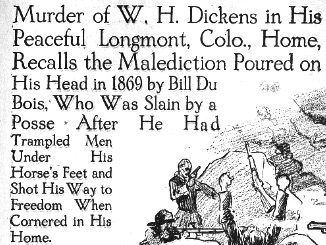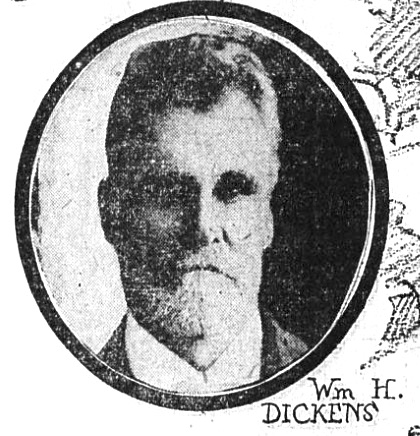
It is not the story of the curse, but the wild flavor of old Colorado that makes me love this story of the posse who hunted down the bad guy. Having spent the previous year living in Colorado, I can picture the story, the land, and the people clearly. It plays better than any old Western I’ve watched.
Bandit’s Dying Curse Fulfilled

Bill Du Bois’ dying curse, uttered in the summer of 1869, when the bandit, riddled with bullets, faced a posse from behind his dead horse in the Colorado hills and called down violent death on the leader and his posse, has been fulfilled. The leader was W.H. Dickens, shot to death this winter in his peaceful Longmont, Colorado home.
The steel clad bullet which pierced the windowpane and killed the banker, did the work which the leaden slug from the French-Canadian’s revolver missed so narrowly forty-six years back, for with his curse Du Bois fired a shot that passed through the crown of Dickens’ hat as he sat on his horse directing the work of primitive justice.
It was a long time ago, and perhaps the Longmont capitalist had forgotten the malediction put on his head in the early days of Burlington. Today, Burlington is gone. The site of the gold town, four miles south of Longmont, on the St. Vrain River, boasts a few gray, weather beaten timbers, but the old timers still remember “the curse of Bill Du Bois.”

There had been bad blood in the country between Du Bois’ crowd and the determined young settlers of Burlington. The stages were held up and the mails robbed too often to suit the men who were trying to build their homes in the foothills.
Finally there was a trial. Du Bois was indicted by a federal grand jury and brought before Uncle Sam on a charge of stealing mail sacks. Dickens and his friends appeared against him, but proof was lacking. The bandit was turned loose.
With hate in his heart for every man who had sought to convict him, Du Bois returned to Burlington, swearing vengeance. The cabin where he lived with his father, still remembered as French, was beyond the rough confines of the settlement.
Waits for Revenge
Du Bois, the hot temper of his race turned evil, starved in the hills for his chance to get even.
One day Ed Kinney, one of the men who had told of his suspicions to the Federal Court, was returning from Boulder, driving a wagon. Du Bois met him on the road.
“You’re one of the devils responsible for calling me a thief,” the bandit said to him at the point of a rifle. “You broke me, now go on to town, get me $500 and bring it here. Two hours you have.”
Two hours later, Kinney appeared and another man in the wagon with him. Du Bois rose out of the grass by the road.
“Got the money?” he asked.
Kinney answered hotly that he did not have it and that he did not intend to get it. The next instant he fell with a hole in his forehead and the team was running back toward town carrying the witness to the murder.
Home is Searched
When the news spread through the little settlement the few score citizens of the place formed a posse immediately under the leadership of Dickens. Ten of them went to the place where Kinney had pitched out of the wagon, but the murderer was gone. They searched the hills without avail.
Nightfall brought them to old Frenchy’s cabin. The white haired father was sitting on a box outside the door smoking. He shook his head. His son had ridden away that morning. He had not seen him since. Why did they want him?

Dickens ordered the place searched. Several men dismounted, the house was surrounded. First they knocked on the door, then tried the lock. Old man Du Bois sat quietly smoking. The door was locked.
“Break it in,” said Dickens.
Two men put their shoulders against it. The wood splintered and gave way. They started forward.
Suddenly out of the darkness there was the crash and flame of shots. A huge shadow sprang into life and out through the door, trampling men and wreckage, rode Bill Du Bois, the reins in his teeth and a revolver spitting lead from each hand.
He got away. Forty armed men were there to capture him, but he got away through sheer nerve, and the surprise of his strategy. Before the posse rode on his trail he was lost in the night.
Through all the dark hours the Burlington settlers hunted, combed the country south of the St. Vrain, The search lasted into the next day. Finally, four miles west of Burlington, Dickens, the leader, saw Du Bois crossing a clearing, his horse lame.
Within an hour the posse was collected and the murderer surrounded. The French-Canadian saw escape was hopeless. He got his horse and took cover behind him.
Several of Posse Hit
For an hour more the battle lasted. Du Bois loaded and fired his two revolvers with desperate coolness. Several in the posse were hard hit, but the rain of bullets that poured down in the man behind the horse soon began to tell. Finally he appeared to collapse. Dickens, the leader, rushed forward.
Then the murderer rose up. Stretching to his full height, one gun still in his left hand, the blood running across his face, he raised his right arm, pointed it at Dickens and cursed. It was a strange curse made up of jumbled Canadian superstitions, Indian medicine, and Anglo-Saxon profanity, but it stayed in the memory of many a man who heard it. The ending particularly stayed.
“Curse you, Dickens, and your crew. You’ve killed me. May you all die as I die with blood and hating.”
He fired with his left hand and fell. The bullet bored a hole through the leader’s hat. When he reached Du Bois’ side, the man was dead.
So ended Du Bois, but the curse remained in men’s minds. The “Curse of Bill Du Bois” formed the topic of many a fireside story. And according to these old timers, every member of that posse, except two still living, have met unnatural deaths.
But Dickens seemed to forget it. His success as an early settler never wavered. He worked hard, fought the pioneer fight and accumulated wealth. Burlington passed into history, and the men who had formed the posse in 1869 were scattered to the four winds.
Days of Violence Pass
Dickens settled in Longmont. The days of violence and excitement also passed into history. Prosperous farmers settled the country where the posse rode the night before the curse. Stores and buildings grew up and the memory of Bill Du Bois grew dim.

Then, forty-six years after, in his peaceful home a message from the past came to Dickens. He died as Bill Du Bois had died, “with blood,” and the story of the curse revived in the memory of the old frontiersmen. Watson Bacon was living in a cabin three miles from the place where the murderer died.
He furnished the details of the tragic story, corroborated by the reminiscences of other early settlers in that district. All of them remember the tradition of the curse. No attempt is made by them to connect the last murder directly with the French-Canadian’s dying wish.
Some call is a strange coincidence. Others shake their heads and look queer. The man who fired the shot has not been captured. Perhaps he could add another chapter to the story.
Source: The Sunday telegram. (Clarksburg, W. Va.), 16 Jan. 1916.

